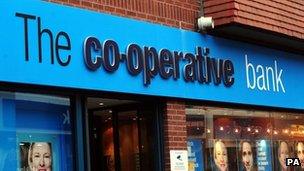Co-op set to unveil 'bail in' plan to plug £1.5bn hole
- Published

The Co-op bank faces questions over its capital position
The Co-operative Bank is set to unveil a rescue plan to tackle the hole in its balance sheet.
The BBC's business editor, Robert Peston, has learned that the hole is around £1.5bn.
He said a lot of the capital to be used to plug the hole will come through a "bail in" - a process where bonds will be turned into shares.
However, the plan makes Co-operative Bank appear much more like a bank than a mutual organisation.
An announcement between the bank and the Prudential Regulation Authority could come within the next few hours.
Under such a rescue deal, it is unlikely that taxpayer money will be required or that savers will be affected, but it could affect up to 5,000 smaller investors.
Concerns about the bank's capital arose after a deal with Lloyds collapsed.
In April, the Co-op cancelled a plan to buy 631 bank branches from Lloyds Banking Group.
That was followed two weeks later by the ratings agency Moody's downgrading the bank's debt to junk status.
The agency warned the bank may need "external support" if it could not strengthen its balance sheet.
In response to Moody's, the Co-op said it had a "strong funding profile" that was "significantly above the regulatory requirements".
But the bank admitted there was a "need to strengthen our capital position in light of the broader economic downturn and the pending introduction of enhanced regulatory requirements".
It added: "We have a clear plan to drive this forward throughout the coming months."
Most of Co-op Bank's problems stem from bad loans associated with its takeover of Britannia Building Society in 2009.
Any agreement with Co-op would be the first test of the new city regulator, the Prudential Regulation Authority, since it assumed responsibility from the Financial Services Authority in April for regulating the banks. Part of its mandate is to ensure that the banks won't have to be bailed out from taxpayer money again.
The Co-operative Group, parent of Co-op Bank, was founded in 1863. It has more than 6 million members and employs more than 100,000 people.
- Published10 June 2013
- Published27 May 2013